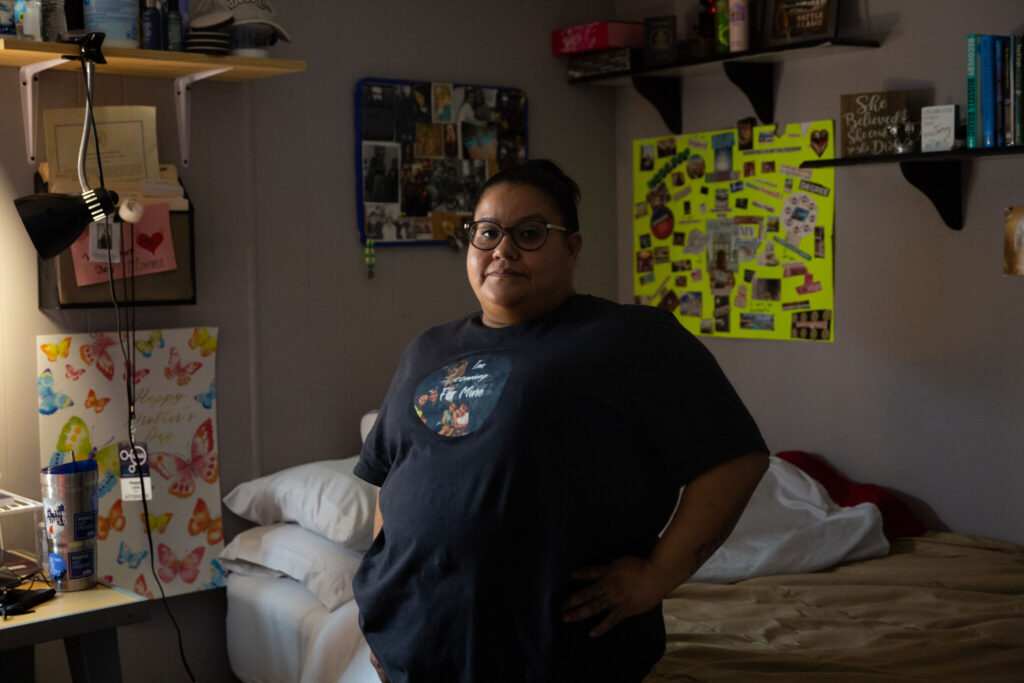
In the last photograph Maggie Luna has of all her children together, they are lined up alongside her by size, at a Houston area Chuck E. Cheese. Two daughters and a son, ages 4, 5 and 9. It’s 2015, and after two decades of struggling with addiction and related episodes of incarceration, a Texas judge has just terminated her parental rights.
“He didn’t even look me in the eye,” Luna, now 40, said in a recent interview. “He just told me that I was going to ‘get’ to set a visit to say goodbye to my children.”
Family court judges who oversee foster care cases wield the power to dissolve all legal ties between a child and a parent they determine is unfit. An unforgiving federal timeline drives the termination of parental rights, often described as “the civil death penalty.”
But two new state laws in Texas that took effect last month aim to provide parents with greater protection from this outcome.
A bipartisan group of elected officials pushed for passage of the bills in the Texas Legislature. House Bill 2926, introduced by Tan Parker (R) and sponsored by Sen. Dawn Buckingham (R) and Reps. Ina Minjarez (D), Matt Krause (R) and James Talarico (D), allows for parental rights to be reinstated under certain circumstances. House Bill 2924, authored by Rep. Harold Dutton (D) and Sen. Bryan Hughes (R), prevents the state from using a prior termination of parental rights as grounds to sever ties with a subsequent child.
While Texas is one of many states to allow for second chances after parental rights have been terminated, legal experts say it is the first to enact a law specifically prohibiting a parent’s prior loss of rights from being the defining factor in a new case.
“Both of the bills will do monumental change around a culture shift away from punitively punishing parents,” said Cynthia Simons, a fellow at the Texas Center for Justice and Equity. Simons said children suffer when the child welfare system focuses on punishing parents, at the expense of supporting families. “There are children languishing in foster care, going from home to home and sleeping in CPS offices — when they have a willing, able parent to take care of them.”
A Second Chance
When children are removed from their parents due to allegations of abuse or neglect, federal law dictates a timeline that parents must comply with in order to reunify their family. If a child is in foster care for 15 of 22 consecutive months and parents have not taken specific steps to regain custody — such as attending parenting classes, leaving an abusive partner or seeking treatment for substance abuse — judges can terminate parental rights and allow the child to be adopted.
According to federal data, Texas has been among the states most likely to terminate parents’ rights within five years of a child entering foster care, with ties severed in roughly 40% of all cases. Only Oklahoma, Arizona, Alaska and Maine outrank Texas in this measure. The national average of foster care cases that end in a parents’ rights being terminated is 25%, with the percent in some states as low as 9%.
Historically, a termination of rights has been permanent — parents are no longer legally able to communicate with children who’ve been separated from them by the courts, until they turn 18 or unless adoptive parents facilitate a reunion.
Now, states across the country are creating pathways for parents to have custody rights reinstated, even after the courts have previously found them to be abusive or neglectful. Under H.B. 2926 — signed into law June 15 by Gov. Greg Abbott (R) — Texas became the 23rd state to enact such a “second chance” law.

“There’s a recognition that we have too easily terminated families, caused trauma to children by doing so, and that we need to figure out how to treat families appropriately,” said Mimi Laver, director of legal representation for the American Bar Association’s Center on Children and the Law. “This is one way of trying to help families heal and bring them back together.”
The reinstatement of rights won’t be easy. Texas will require parents to wait two years after their rights have been terminated before petitioning the court. And they cannot even make a request if their child has already been adopted or is living with a foster family that is planning to adopt them.
Parents must also convince a judge they have ameliorated the circumstances that led to the loss of custody rights, and children 12 and older must consent to the revised arrangement.
Judges can reject the petitions, as long as they provide their reasoning, and in those cases parents can’t reapply for another year.
“They have some good safeguards in place to make sure that it’s really best for everyone,” said Kerrie Judice, a child welfare policy analyst at TexProtects, a nonprofit focused on preventing child abuse.
Advocates and attorneys for parents and children said the law is a step toward a system that prioritizes the best interests of children, as circumstances in their family shift. In foster care cases, custody rights are most often threatened due to issues closely linked with poverty, not physical or sexual abuse. And the overwhelming majority of parents impacted are people of color.
Texas’ foster care system is under harsh scrutiny. It’s been hammered in federal court for a decade for housing children in CPS offices, abusive group homes and other unsafe settings.
Meanwhile, advocates say parents who have become stable since losing custody rights — and who could now safely parent if given a chance — are barred from re-entering their children’s lives.

Luna says she is among them. She’d quit using drugs during her first pregnancy, she told The Imprint, and a few years later she gave birth to two more children. The children’s father left her to raise all three kids alone, and they were evicted from their Houston home. In her desperation, Luna’s addiction resurfaced, and her children were taken into foster care.
In 2016, after her parental rights were terminated, she fell into a deep despair and found herself back in prison.
A visit from her oldest daughter while she was locked up became a turning point, however. Upon release, inspired to be the parent her children needed, she became a vocal advocate for reinstating parents’ rights as a fellow with the Texas Center for Justice and Equity.
“I just started going into every office and saying look, my son is in the state’s custody, they cannot take care of him,” Luna said.
At that point, she had been sober for five years and lived in a stable home, with an extra bedroom she never rented out because she kept the faith that one day her child would come home. “There’s just no reason that he’s still suffering,” she told any lawmaker who would listen.
Attorney Simons, who helped craft the recent Texas legislation, notes that parents who “revamp their lives” after being legally cut off from their children show great integrity: They’re making changes when no one is telling them to, or holding them accountable, she said, solely out of their own conviction to be ready if their children ever come back to find them.
A Fairer Shot in the Future
Parents who have additional children after previously losing custody rights can face stiff penalties if they again come under investigation by child welfare authorities. A second new law in Texas that took effect Sept. 1 offers these parents a new layer of protection if they find themselves back in family court.
In most child welfare cases, authorities are required to offer services and supports to help keep struggling families together. But under the 1997 federal Adoption and Safe Families Act, that obligation is waived if the parent has already lost rights to another child. In those cases, the process leading to termination of parental rights can be fast-tracked, without granting parents time to prove to the court they are safe to parent, and without time for child welfare agencies to provide them with the services and support they may need.
Some legal experts say this shortcut — often called a “bypass” to reunification — is unconstitutional, violating parents’ due process rights.
Attorney Vivek Sankaran, director of the Child Advocacy Law Clinic at the University of Michigan Law School, said three Supreme Court cases require child welfare agencies to provide current evidence that a parent is unsafe in order to terminate their rights. They can’t assume that someone is unable to parent solely because they’d struggled in the past.
“Those of us representing families and kids know that you could have your rights terminated for a myriad of reasons, and many of them may not be applicable years later,” said Sankaran, a regular columnist for The Imprint.
To that end, H.B. 2924 helps ensure Texas parents’ fitness is always evaluated based on their current circumstances. New abuse and neglect allegations would still be investigated, but services for parents, and the time needed to complete them, would also be guaranteed.
The Texas law “seeks to ensure parents are not penalized for past mistakes by removing this as a ground for involuntary termination of the parent-child relationship,” the bill authors wrote in a statement of intent.
Nationwide, courts remain divided on the issue: The “reunification bypass” was struck down in a 2014 Kansas appellate case, and multiple times in Illinois appellate and supreme court cases, while judges in Minnesota, New Mexico and California have upheld its constitutionality.
Local laws in ten states put a cap on how long terminated rights can be used against parents in new family court cases, or require proof that the problem resulting in the original custody loss is ongoing.
While Luna has succeeded in her advocacy efforts, she’s still fighting to repair her own family. She described her closest relationship with her eldest 15-year-old daughter, who was adopted by Luna’s mother. But she has lost all touch with her youngest daughter, now 10. She was adopted by foster parents immediately after Luna’s parental rights were terminated.

The woman who Luna’s youngest daughter would grow up calling Mom was at the 2015 goodbye visit, and promised to help Luna and her toddler stay connected. But that never happened, she said.
“She told me, don’t worry, I’ll keep in touch with you,” Luna recalled. “I have not received anything, ever, from them. So, I don’t even know where my daughter is.”
Now, under the new laws in Texas, Luna is able to petition the court for the return of her other separated child, her son, who remains in foster care after six years. Multiple state legislators have written letters of recommendation on Luna’s behalf in her quest to have the boy, now 11, returned home.
Thinking ahead at the prospects, she said after all he has been through during his short life, she knows bringing her son home will not be easy. But she said she’s ready to take on the challenge of parenting a hurting boy.
“Yes, he’s difficult; yes, he’s angry,” Luna said. “But I understand that pain and trauma. And I’ve been through treatment and therapy for it. Who better to deal with him than somebody who’s been there?”
In the original version of this story, The Imprint incorrectly stated that H.B. 2926 was authored by Sen. Dawn Buckingham. The story has been updated.





